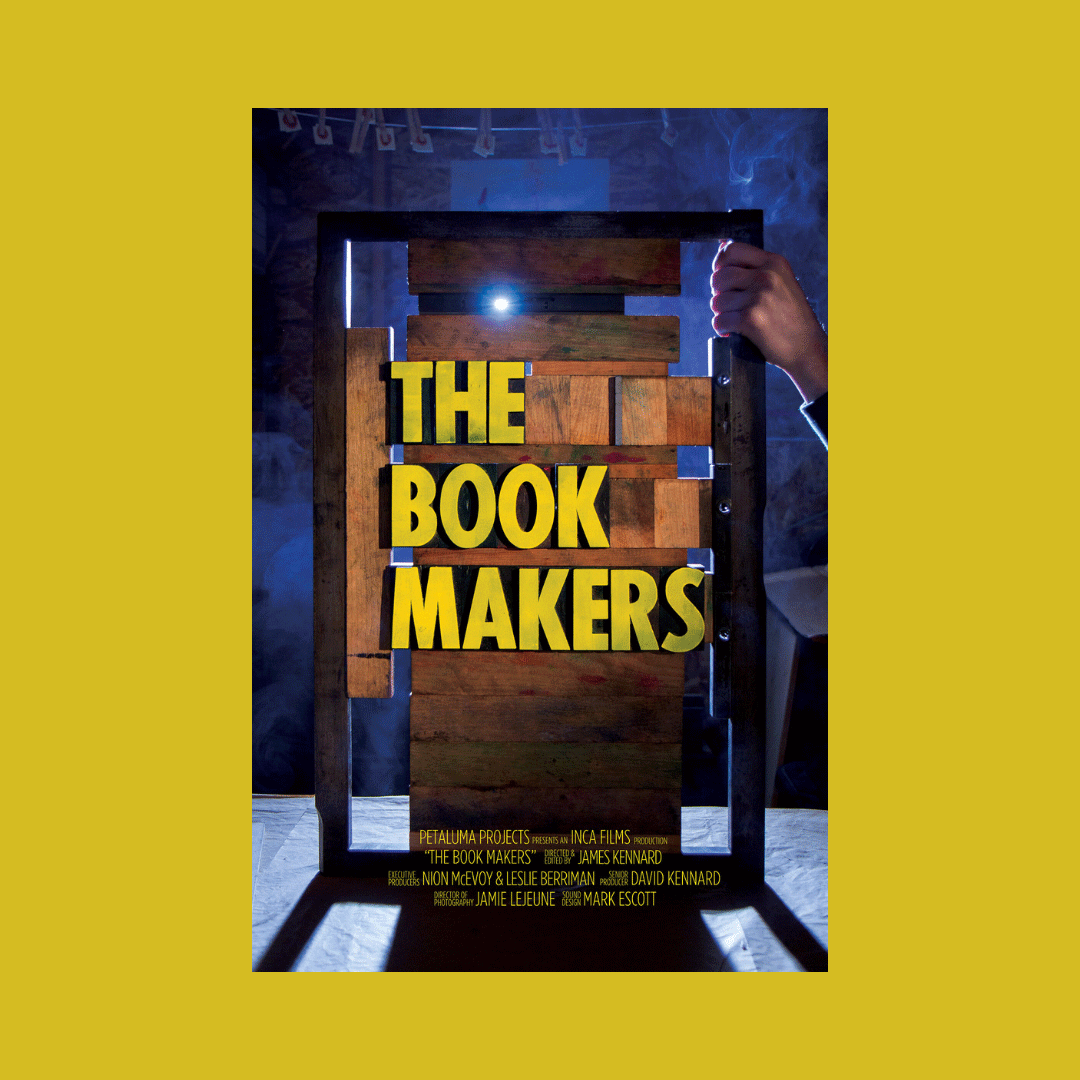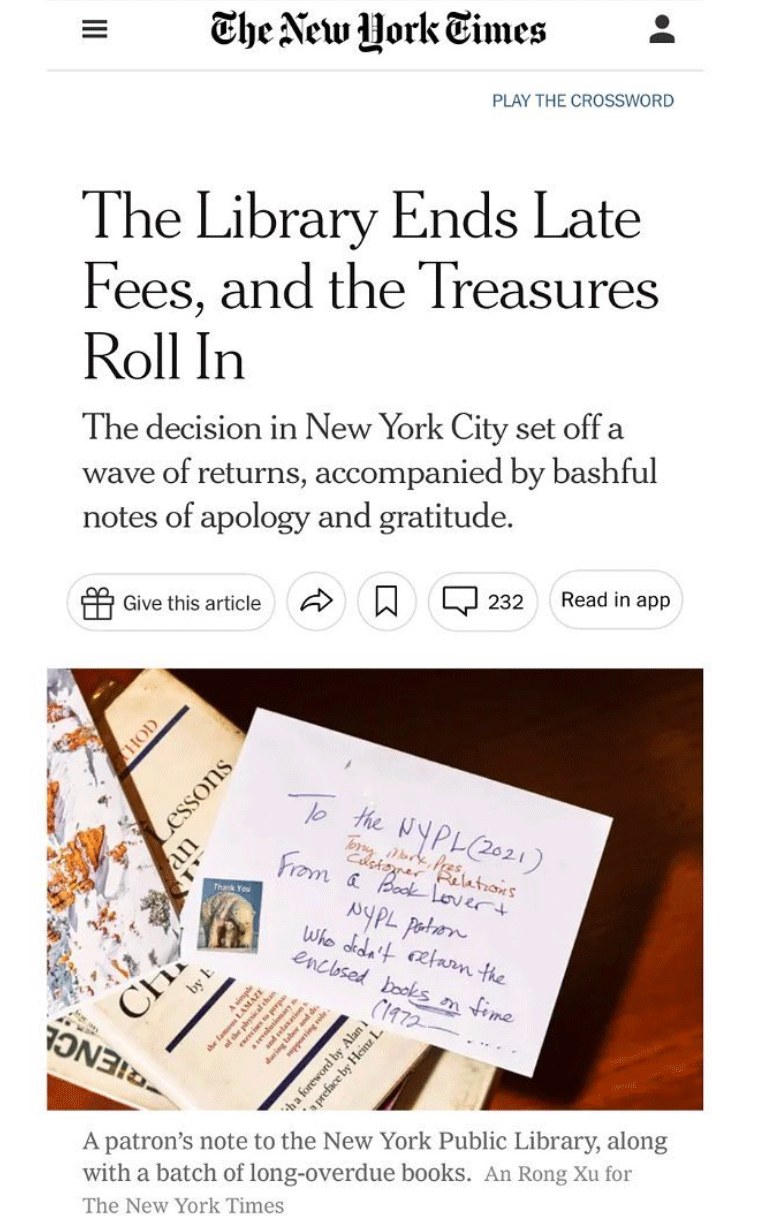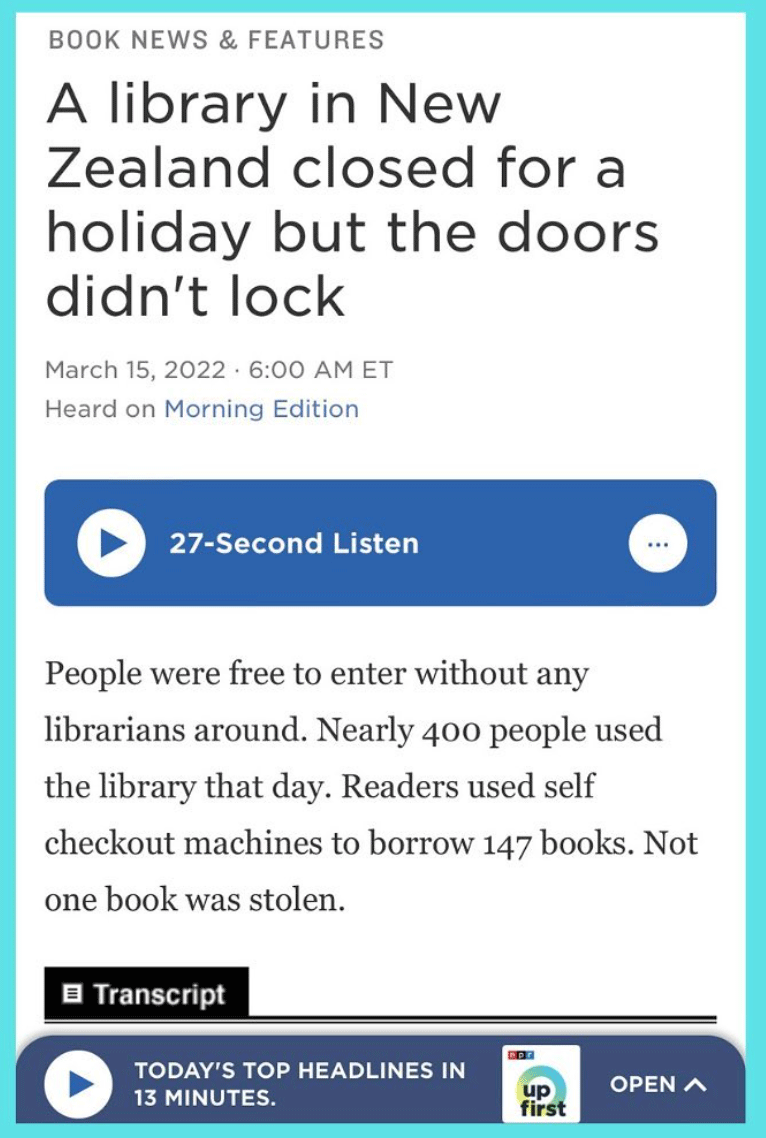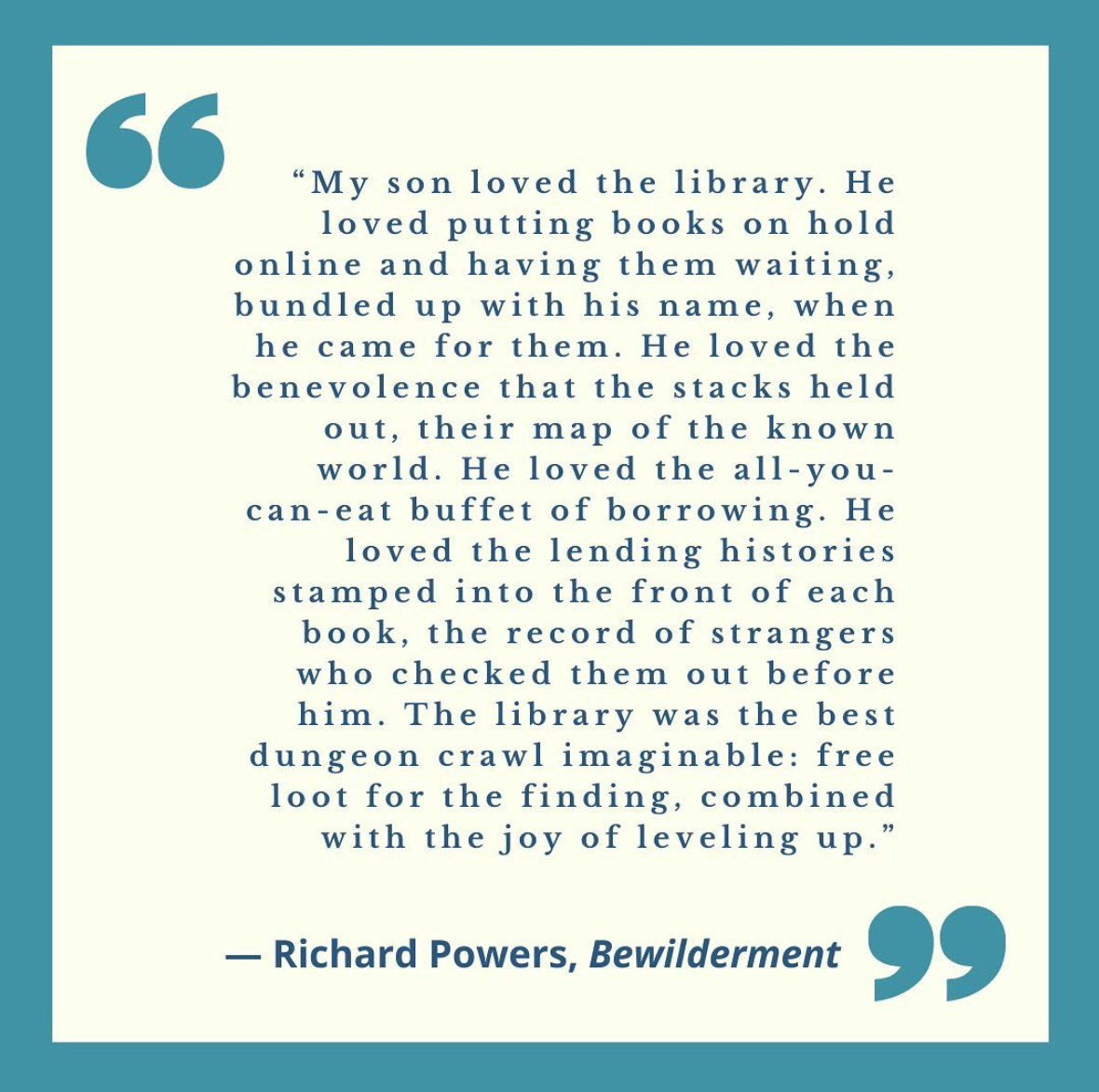
READ ALL ABOUT IT
Since 2012, I’ve been writing about books. And the act of reading. And the importance of story and narrative. But, mostly, the underlying theme of all I write is how taking a moment to stop and digest some longform text — instead of scrolling, instead of watching a video, instead of multitasking — can be one of the most grounding things we can do for ourselves. Here’s the one-stop online home for all this writing.
You can read more about me and my work by moseying over here. Want to peruse periodic “essay drops” — excerpts from my work-in-progress essay collection about Homesickness? Here ya go.

The Secret Apartments Hidden Above Carnegie Libraries
What does it mean to live in a library? There’s sort of a cachet to co-habitating with so much art, culture, and knowledge, á la From the Mixed-Up Files of Mrs. Basil E. Frankweiler, isn’t there? In the 21-st century this would take the form of a quick-edit video posted to social media: “Come with me as I tour a library-turned-apartment!” Or “POV: You live in an old library.” (And then cue all the book-lovers responding with 😍😍😍 [🙄])

Connected. Curious. Good.
From Newsletter Issue No. 20:
“Reading deepens. Social media keeps you where you are. Reading makes your mind do work. You have to follow the plot, imagine what the ballroom looked like, figure the motivations of the characters—I understand what Gatsby wants! All this makes your brain and soul develop the habit of generous and imaginative thinking. Social media is passive. The pictures, reels and comments demand nothing, develop nothing. They give you sensations, but the sensations never get deeper. Social media gets you stuck in you. Reading is a rocket ship, new worlds.” — Peggy Noonan

Reading is Grounding
Until we moved, we were daily newspaper subscribers — meaning actual, physical papers. (We’ll get back to it!) I have a hard time keeping up digitally (we have a handful of digital news subs) partly for the reasons that Cal Newport discussed in a newsletter about unplugging (for a bit) after you vote: “I suggest you switch to a slower pace of media consumption. Don’t laugh at this suggestion, because I’m actually serious: consider picking up the occasional old-fashioned printed newspaper (free from algorithmic optimization and click-bait curation) at your local coffee shop or library to check in, all at once, on anything major going on in the world.” Personally, I like to see the news laid out in one place, not click around on some rabbit trail.

Put a Little Book House in Your Soul
It’s that time of year 🍂🍁🍂🍁

The Old-School Library at OpenAI
A prevailing sentiment among “book people” is that ChatGPT should cause consternation and hand-wringing. I get that. But while technology and automation may be replacing some jobs, I still don’t think it can replace the job of a novelist. Well, let me rephrase: There are some sorts of books that, yes, could likely be written using AI. Mostly, the dubious part in my eyes is copyright infringement. (And also that you can’t cut-and-paste emotion!)

I Love LA
Recent headline in the NYT: “Why the LA Public Library Acquired a Book Publisher.” The owners of Angel City Press — a small, 32-year-old shop dedicated to LA-specific books that are “drenched in nostalgia but undeniably cool” (yessssss!) — were ready to retire so offered up the whole shebang to the local library system.

Gen Z and Millennials to Libraries’ Rescue
According to a recent study released by the ALA (American Library Association), 54 percent of those surveyed in the Millennial and Gen Z cohorts responded that they had visited a library in the past year. Woohoo, great.

The Book Makers
Something that I used to post about more often was this idea of book-as-object.
* It was sometimes in a playful way: Are fake books ok décor? What about spines-in shelving? (FYI, I’ve cooled my jets on rainbowtizing shelves.)
* Sometimes in a “wow, humanity” way: Whose eyes were skimming this exact library book before mine? And what were they thinking?
* And sometimes in an archival way: I love the idea of antiquarian/rare books (watch the documentary The Booksellers!), but I am mostly happy just to own a bunch of beat-up paperbacks. Either way, the paper, font, cover art, and blurbs all point to a moment in time when a specific edition was printed. Add in readers’ penned-in notes and underlines and you have a perfect artifact.

Eastham Library
I’m just a girl,
Sitting in front of a Cape Cod pond,
Asking myself…

Boston Literary and Library Love
Here are two snippets of Boston literary/library love for you today.

The Library at Home
As we prepare to leave this house — and as we let prospective buyers through if they’ve heard about its future availability — Matt and I have spent many weekends organizing, purging, donating, scrubbing. Which of course included a massive tidy of some bookshelves. I know it’s likely I’ll be asked to “stage” them better — fewer books, more #decorativevases. Because as we all know (due to pox-on-society HGTV), the goal is to “remove” traces of oneself and one’s family from a home when it’s for sale. And since, in many ways, the books on our shelves tell my life’s story…out they go. But I can’t live like that in real life.

Turning Nairobi’s Public Libraries Into ‘Palaces for the People’
Here’s a NYT article about the McMillan Library in Nairobi and how a dedicated group of organizers and fundraisers have gone about restoring the colonial-era institution — initially serving only white patrons — and turning it, and other libraries like it, into “palaces for the people.” According to Keynan publisher Angela Wachuka, “…we are here to also reclaim history, to occupy its architecture and to subvert its intended use.”

Library or Police Station in McFarland?
Whooooo… (Picture me whistling in an ‘oh boy’ kind of way, not that I know how to do that). I picked up this article the other day. It’s part of the New York Times’ “Across the Country” series. In this installment, a reporter goes to McFarland, California, a migrant farming community. The Police Department needs more space, and it’s eyeing the public library. Not surprisingly, conflict has ensued. The library of course offers services beyond checking out books: “Perhaps more so than in wealthier places with more options, the library serves a vital role. On average, 200 to 250 people come through the doors daily.” And many would agree that communities need effectively staffed and resourced police departments. McFarland, in particular, is seeing higher crime rates and an uptick in violent gang activity.

NYPL Got Rid of Late Fees and Check Out What’s Being Returned
Has your library gone fine-free? Mine did starting earlier this year, but I’ve been paying attention to this phenomenon for years — pretty much since I started this account. There’s a bunch of research as to why eliminating late fees is a smart choice, but the research doesn’t take into account the added benefit of seeing all the interesting things that get returned once people feel that’s it “ok” to untether themselves from things they’ve (likely inadvertently) had for years and years and years.

Not Locked Out of a New Zealand Library
Fun story on NPR’s Morning Edition the other day.

Case in Point: Framingham School Libraries
“Students in Framingham are checking out more books from the library: Here’s why.” This MetroWest Daily News article popped up online yesterday. Framingham borders the town where I live.

Dr. Richard Macksey’s Viral Yet Non-Existent Library
Ok, we all know Instagram loooooves this kind of image, but before you blindly double tap, read on!

Libraries are Benevolent
The two books I’ve read by Richard Powers — The Overstory and Bewilderment — are so full of profound nuggets of wisdom about, well, life. And you can probably find many of them aggregated on sites like Goodreads. This one isn’t really “life wisdom,” but it really is a nice way to describe a library, isn’t it?

What Happened to Amazon’s Bookstore?
I just finished Bewilderment by Richard Powers. (Really great!)
I have way too many books out from the library at the moment, including A Calling for Charlie Barnes by Joshua Ferris, The Paper Palace by Miranda Cowley Heller, and Why We Can’t Sleep: Women’s New Midlife Crisis by Ada Calhoun (that’s funny). Plus 3 others. Like a kid in a candy shop…

Just a Pic of a Little Free Library
I just finished Bewilderment by Richard Powers. (Really great!)
I have way too many books out from the library at the moment, including A Calling for Charlie Barnes by Joshua Ferris, The Paper Palace by Miranda Cowley Heller, and Why We Can’t Sleep: Women’s New Midlife Crisis by Ada Calhoun (that’s funny). Plus 3 others. Like a kid in a candy shop…

